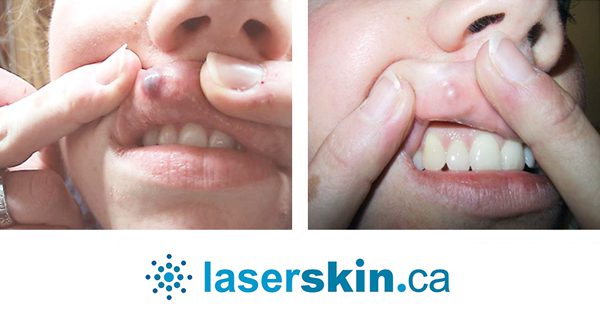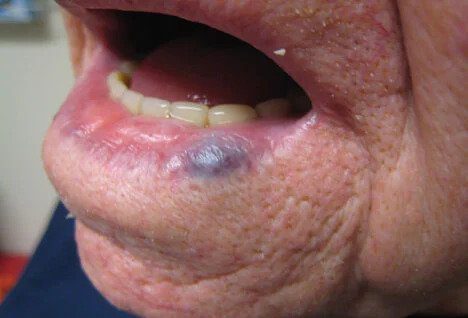VENOUS LAKE
Our Elite iQ long-pulsed Nd:YAG laser is highly effective treatment for venous lake of the lip and cheeks.
Our Elite iQ long-pulsed Nd:YAG laser is highly effective treatment for venous lake of the lip and cheeks.

A venous lake is a dilated ‘lake-like’ venule in the upper dermis typically seen on the lips or ears of elderly patients. These lesions are dark-blue to purple, soft, raised nodules, usually 2 to 10 mm in diameter.
It is a small blood vessel (vein) in the skin, which has enlarged and wider (or broader) over time.
What causes a venous lake?
It is thought that long-term sun exposure can cause venous lake and possibly smoking, although the cause is unknown.


The cause of a venous lake still needs to be understood entirely. The most likely reason is chronic sun damage to the walls of the superficial veins. This damage leads to the dilation of veins on the skin’s surface, resulting in an elevated, dark blue papule.
While most venous lakes appear on the lip, they can also form on the neck, ears, or backs of the hand. A venous lake is not painful or dangerous. These lesions can be effectively eliminated using a vascular laser device at our clinic.
What is a lesion of a venous lake?
A venous lake lesion is a form of vascular lesion that manifests on the skin as a small, dark blue or purple bump. It is caused by the dilation of blood vessels in sun-exposed areas of the skin, such as the face, eyebrows, and lips.
What causes venous lake lesions?
The dilation of the skin’s blood vessels is what causes venous lake lesions. The precise cause is unknown, but it is believed that chronic sun exposure, genetics, or ageing are involved.
Are venous lake lesions common?
Lesions of the venous lake are relatively common, particularly in older individuals. They can occur on any part of the body and affect both men and women, although they are most commonly found on the face, ears, and lips.
Who is susceptible to venous lake lesions?
Lesions of the venous lakes can occur in people of all ages, but they are more prevalent in those with fair skin and extensive sun exposure. People who spend a great deal of time or labour outside may be more susceptible to developing venous lake lesions.
Are venous lake lesions dangerous?
Lesions of the venous lake are typically benign and require no treatment. In uncommon instances, they may bleed or become infected. Consult a healthcare provider immediately if a venous lake lesion becomes painful or changes in appearance.
Can venous lake lesions be cancerous?
Venous lake lesions are not malignant. These benign vascular lesions do not enhance the risk of developing skin cancer.
How are lesions of venous lakes diagnosed?
Typically, venous lake lesions are diagnosed through visual examination. A dermatologist may use a dermoscope, a specialized instrument that magnifies the skin, to examine the lesion in more detail. A biopsy may be performed to confirm the diagnosis if there is any uncertainty.
What are the symptoms of venous lake lesions?
Venous lake lesions typically do not cause any symptoms other than their appearance. They are usually painless and do not itch or cause any discomfort.
Can lesions of venous lakes be prevented?
Venous lake lesions cannot be prevented, but individuals can reduce their risk of developing them by protecting their skin from excessive sun exposure. This can be achieved by wearing protective clothing, using a broad-spectrum sunscreen with an SPF of at least 30, and seeking shade during peak sun hours.
How are venous lake lesions treated?
Venous lake lesions can be treated through laser therapy, electrocautery, or surgical excision. Laser therapy uses a focused beam of light to shrink the blood vessels in the lesion, while electrocautery uses heat to destroy the lesion. Surgical excision involves removing the lesion with a scalpel. Treatment is not always necessary, and many individuals choose to leave venous lake lesions untreated.
Is treatment for venous lake lesions painful?
The level of pain associated with treatment for venous lake lesions depends on the method used. Laser therapy and electrocautery are minimally invasive and typically cause little discomfort. Surgical excision may require local anesthesia, and there may be some pain and discomfort during the healing process.
Can venous lake lesions recur after treatment?
Venous lake lesions may recur after treatment, especially if the underlying cause is not addressed. To reduce the risk of recurrence, individuals should protect their skin from sun exposure and seek prompt treatment if a new lesion develops.
Can venous lake lesions be confused with other skin conditions?
Venous lake lesions can be mistaken for other types of vascular lesions, such as hemangiomas or pyogenic granulomas. Venous lake lesions can also be mistaken for melanoma, a type of skin cancer, because they may appear dark in color. However, melanomas usually have an irregular shape and may be accompanied by other symptoms, such as itching or bleeding. A healthcare provider can differentiate venous lake lesions from other skin conditions through a physical examination and, if necessary, a biopsy.
Are there any complications associated with venous lake lesions?
In rare cases, venous lake lesions can bleed or become infected. If a venous lake lesion becomes painful, bleeds excessively, or shows signs of infection, such as redness or swelling, it is important to seek medical attention.
Can venous lake lesions be a sign of a more serious condition?
Venous lake lesions are usually benign and do not indicate a more serious condition. However, individuals should always consult with a healthcare provider if they notice any changes in their skin, such as a new lesion or a lesion that changes in appearance. This is especially important if the lesion is accompanied by other symptoms, such as pain or bleeding. A healthcare provider can determine if the lesion is benign or if further evaluation is needed.
By providing your phone number you agree to receive informational text messages from laserskin.ca. Consent is not a condition of purchase. Message frequency will vary. Msg & data rates may apply. Reply HELP for help or STOP to cancel.
In conclusion, venous lake lip conditions, benign vascular lesions that typically appear as dark blue or purple spots on the lips, can be effectively managed with the right treatment. The options for treating a venous lake on the lip include laser therapy, recognized as a successful approach. Patients seeking venous lake lip treatment often report high satisfaction rates due to these modern therapies’ non-invasive nature and effectiveness.
Although venous lakes, sometimes called venus lakes when appearing in groups, are generally innocuous, numerous people opt for removal due to aesthetic preferences. The procedure to eliminate a venous lake on the lip is usually uncomplicated, and with the progress in dermatologic procedures, patients can anticipate notable results with minimal recovery time. Individuals contemplating treatment for a lip venous lake should seek advice from a dermatologist to determine the most effective strategy and to guarantee that the removal is conducted with optimal safety and efficacy.